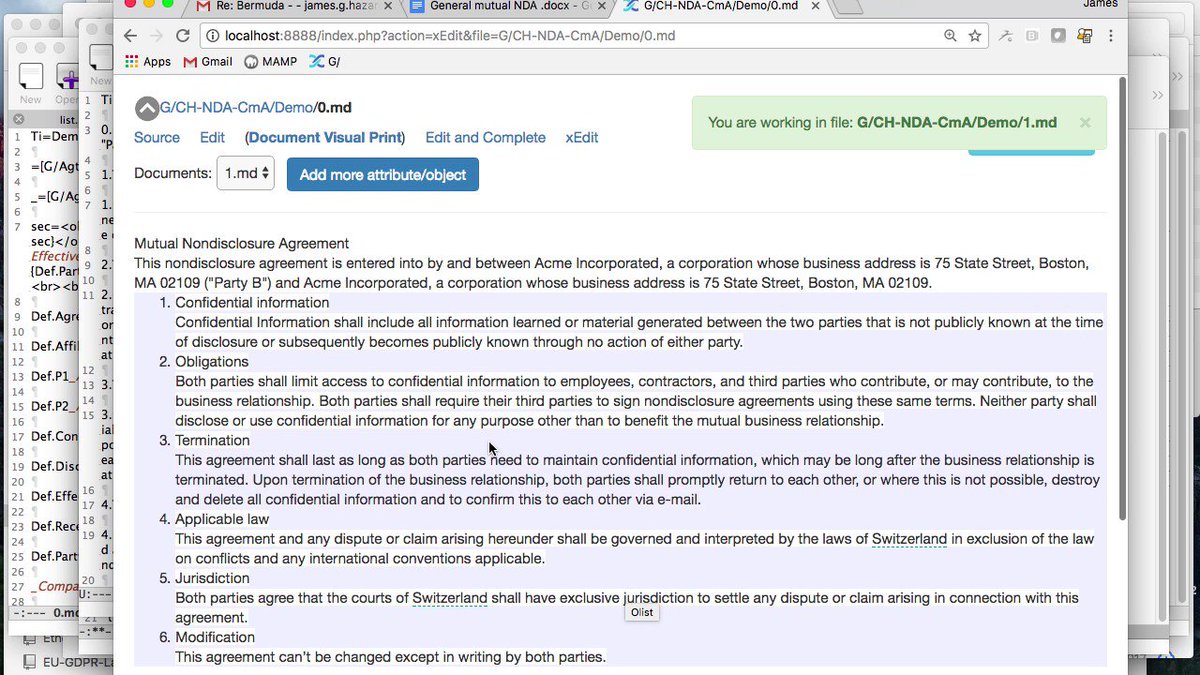#proseobjects ผลการค้นหา
If inter-company record exchanges (contracts!) are expressed in a common, computable, converging format, then the inner automations of each party will tend to converge. #ProseObjects? E.g. commonaccord.org/i.php?v=l&f=G/… @mZargham @metagov_project @ycombinator
"Centralization in social systems can apply to concepts, too. ... The Semantic Web must avoid such conceptual bottlenecks just as the Internet avoids such network bottlenecks." #ProseObjects avoids ontological centralization/imperialism via "overriding". Git, too.
Yes — and our work on a User-Managed Access (@UMAWG) Business Model plans to use #ProseObjects to help enable a license-based model for controlling access rights to personal digital assets: kantarainitiative.org/file-downloads…
Or a #git repo as deal room and #ProseObjects as structured documents. Pioneered by @block_science. @mZargham @ChrisCatoya
Legal "Prose" is one such layer. (Lawyers' layer?) Interoperability (and decency) requires us open source it. With emphasis on both "open" and "source." #DecentLaw #ProseObjects @DanLinna For instance - github.com/CommonAccord/O…
Jason, might your thoughts on "markdown" be approaching a transformation for #ProseObjects - e.g. create taxonomy objects and fulfill with key/value parameters - with various views (click "document"), and the freedom to override (extend the ontology). janlin.herokuapp.com/index.php?acti…
#CodeMaybeIsNtLaw. Linguistic flexibility, law, intent. @MeganPHMa #FutureLaw2022 #ProseObjects #DecentLaw
#ProseObjects are "typeless" and "cruftless" - but still graphs - which seem advantages for collaborative legal codification and "composability". Agnostic as to JSON/XML/Cicero - commonaccord.org/index.php?acti…
. @Judgeschlegel: online legal forms improve justice. Yes And they can be systematized, made computable, consistent and mostly short, by using web methods. #ProseObjects @DecentLaw @SALIalliance @damienriehl @DanLinna @mZargham
If the point of AI parsing is to identify structure (. ontology) in case n-coming contract blobs (docs) - wouldn’t it be better to just express them in structure (source) throughout the negotiation? #ProseObjects
The creation of AI that actually understands contracts could overturn the pricing model of pretty much every professional service industry... It's just we have no actual clue how to build such a system. In the meantime folks, how about we focus on what we can do now?
All of this can be facilitated/accelerated if the forms are published in a "source" format that invites tweaking. We suggest #ProseObjects, and have made many examples at github.com/CommonAccord, including of many of the forms mentioned here. 5/5
why are the needs of lawyers and devs are THAT different? They may speak different languages but they're coding algorithmic policies. Coders SHOULD think about things lawyers think about and one property of #ProseObjects is that they force lawyers to think more like coders.
And of course there approaches to contract management that are free, as in speech and beer. #ProseObjects
I have and I did. Not entirely sure how the #proseobjects thing will map onto case law. It seems to rely on a lot of apriori rule adherence and a judge is never going to produce a judgment that fits the model.
“Manage your Legal dependencies like your Code dependencies.” @Github @Code #ProseObjects. Jupyter to Earth, and data? @BSCILabs @mZargham @metagov_project
Perhaps the problem of knowledge capture can be solved if everyone in the process is doing their work by filling in or filling over (overriding) a form. #ProseObjects #DecentLaw @damienriehl
Another view for object-oriented legal docs: a kind of stack-trace for #ProseObjects. commonaccord.org/index.php?acti… @a16zDAO @BSCILabs Giving names to objects @SALIalliance @damienriehl
Yes, trained sets can be used to create models - either for direct use or as reference for "meaning." At a 2016 meeting at @medialab @LegalScience, RAVN (@imanage) demonstrated plucking terms out of raw docs and expressing them as #ProseObjects. Both Human and IT Compatible.
One example of lawyers looking broadly at deployment is @SALIorg - an ontology for all legal matters. SALI is expressed as a "graph" (Euler, et al.). #ProseObjects are also a "graph." Document solutions expressed as #ProseObjects could be made available at the tips of SALI.
. @Judgeschlegel: online legal forms improve justice. Yes And they can be systematized, made computable, consistent and mostly short, by using web methods. #ProseObjects @DecentLaw @SALIalliance @damienriehl @DanLinna @mZargham
Another view for object-oriented legal docs: a kind of stack-trace for #ProseObjects. commonaccord.org/index.php?acti… @a16zDAO @BSCILabs Giving names to objects @SALIalliance @damienriehl
“Manage your Legal dependencies like your Code dependencies.” @Github @Code #ProseObjects. Jupyter to Earth, and data? @BSCILabs @mZargham @metagov_project
Can we "model" all of #OurDigitalTwin as: 1. Layers of 2. Objects, with 3. Attributes And overriding. #ProseObjects A business, legal, technical (#BLT @dazzagreenwood) "graph". Modelling the EU Economy @OpenTrustFabric @StieberHarald Modeling in CAD Modeling @BSCILabs
#CodeMaybeIsNtLaw. Linguistic flexibility, law, intent. @MeganPHMa #FutureLaw2022 #ProseObjects #DecentLaw
"Centralization in social systems can apply to concepts, too. ... The Semantic Web must avoid such conceptual bottlenecks just as the Internet avoids such network bottlenecks." #ProseObjects avoids ontological centralization/imperialism via "overriding". Git, too.
Doc&Diff. Referencing as general method for better contracting. Cf. #ProseObjects @DanLinna @mZargham @CodeXStanford
So, pretty please, with sugar on it: use the form the way it's intended or you create more work for everyone. Or at least throw out your marked version to make it clear that you know you changed it and you're not trying to pull a fast one. Trust is too valuable to waste. /end
Or a #git repo as deal room and #ProseObjects as structured documents. Pioneered by @block_science. @mZargham @ChrisCatoya
Perhaps the problem of knowledge capture can be solved if everyone in the process is doing their work by filling in or filling over (overriding) a form. #ProseObjects #DecentLaw @damienriehl
#ProseObjects are "typeless" and "cruftless" - but still graphs - which seem advantages for collaborative legal codification and "composability". Agnostic as to JSON/XML/Cicero - commonaccord.org/index.php?acti…
And of course there approaches to contract management that are free, as in speech and beer. #ProseObjects
Yes, trained sets can be used to create models - either for direct use or as reference for "meaning." At a 2016 meeting at @medialab @LegalScience, RAVN (@imanage) demonstrated plucking terms out of raw docs and expressing them as #ProseObjects. Both Human and IT Compatible.
The potential overrides can be planned - as with @Bonterms_corp. Overrides can also be generalized - as with #ProseObjects - such that any granular part of the model can be overridden. Making the ontology "open", "learning", "greedy."
If the point of AI parsing is to identify structure (. ontology) in case n-coming contract blobs (docs) - wouldn’t it be better to just express them in structure (source) throughout the negotiation? #ProseObjects
The creation of AI that actually understands contracts could overturn the pricing model of pretty much every professional service industry... It's just we have no actual clue how to build such a system. In the meantime folks, how about we focus on what we can do now?
Legal "Prose" is one such layer. (Lawyers' layer?) Interoperability (and decency) requires us open source it. With emphasis on both "open" and "source." #DecentLaw #ProseObjects @DanLinna For instance - github.com/CommonAccord/O…
Jason, might your thoughts on "markdown" be approaching a transformation for #ProseObjects - e.g. create taxonomy objects and fulfill with key/value parameters - with various views (click "document"), and the freedom to override (extend the ontology). janlin.herokuapp.com/index.php?acti…
Managing complexity by encapsulation. Deeply clarifying analysis. Deeper than me (merely a lawyer), but … perhaps we could see a decision hierarchy of algorithm<data<people as a way of “encapsulating complexity.” @mZargham #RicardianContracts #ProseObjects
Much in this thread on words vs patterns vs algorithms. Perhaps pointing to the principal driver of centralization - the absence of immediately available ontologies for pair/peer-based coordination. #WiseContracts #ProseObjects @mZargham @metagov_project @MeganPHMa
CommonAccord - Simple NDA - Swiss Law - github.com/JuridicalSlotM… dub.io/s/302112 #commonaccord #proseobjects

Something went wrong.
Something went wrong.
United States Trends
- 1. Ukraine 458K posts
- 2. #FanCashDropPromotion 3,303 posts
- 3. Le Cowboy N/A
- 4. #FursuitFriday 12.5K posts
- 5. Putin 151K posts
- 6. #pilotstwtselfieday N/A
- 7. #TrumpCrushesYourDreams 3,002 posts
- 8. #FridayVibes 6,583 posts
- 9. Dave Aranda N/A
- 10. ON SALE NOW 13.1K posts
- 11. John Wall N/A
- 12. Sam LaPorta N/A
- 13. Kenyon 1,716 posts
- 14. Fang Fang 13.6K posts
- 15. October CPI 1,503 posts
- 16. Abbott Elementary N/A
- 17. Mark Kelly 78.7K posts
- 18. UNLAWFUL 152K posts
- 19. SINGSA LATAI EP4 171K posts
- 20. Arman 8,634 posts







